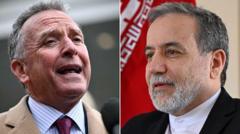Following President Trump's decision to exempt Russia from tariffs affecting 180 other nations, oil prices have dropped significantly. This decline poses a risk to the Russian economy and could ultimately weaken its war efforts in Ukraine, raising concerns about long-term financial implications.
Trump's Tariff Decisions: The Unseen Impacts on Russia's Economy

Trump's Tariff Decisions: The Unseen Impacts on Russia's Economy
As Trump suspends tariffs on Russia, oil prices plummet, potentially causing greater harm to the country’s finances amid the ongoing conflict in Ukraine.
The political landscape shifted dramatically with President Trump's recent decision to suspend tariffs on Russia while imposing them on 180 other nations, aiming to reshape global trade dynamics. While this move could appear to favor Russia, the broader economic repercussions may unravel the Kremlin's financial stability. Oil prices, which serve as a crucial lifeline for the Russian economy, have plummeted by nearly 15 percent since Trump's tariff announcement on April 2, sparking fears of a potential global economic downturn.
Despite the tariff suspension over the next 90 days, experts warn that a continued slump in oil prices could necessitate budget cuts from the Kremlin as early as this summer. Analysts believe that such financial retrenchment may even jeopardize military funding, posing a substantial risk to Russia's capabilities in its conflict with Ukraine.
Preceding this economic uncertainty, President Vladimir Putin appeared to gain momentum in the ongoing war, with perceptions of a closer alignment with Trump's administration. The U.S. approach towards its European allies, who have staunchly supported Ukraine, raises questions about the geopolitical ramifications as trade relations between the U.S. and China face challenges. This scenario may inadvertently facilitate Putin's aspirations for a multipolar world, despite the instability created by tariffs and shifting commodity prices.
The long-term effects of Trump's trade decisions on Russia reveal a complex interplay that could detrimentally impact the Kremlin's war finance capabilities, potentially undermining efforts to sustain its military ambitions in the region.
Despite the tariff suspension over the next 90 days, experts warn that a continued slump in oil prices could necessitate budget cuts from the Kremlin as early as this summer. Analysts believe that such financial retrenchment may even jeopardize military funding, posing a substantial risk to Russia's capabilities in its conflict with Ukraine.
Preceding this economic uncertainty, President Vladimir Putin appeared to gain momentum in the ongoing war, with perceptions of a closer alignment with Trump's administration. The U.S. approach towards its European allies, who have staunchly supported Ukraine, raises questions about the geopolitical ramifications as trade relations between the U.S. and China face challenges. This scenario may inadvertently facilitate Putin's aspirations for a multipolar world, despite the instability created by tariffs and shifting commodity prices.
The long-term effects of Trump's trade decisions on Russia reveal a complex interplay that could detrimentally impact the Kremlin's war finance capabilities, potentially undermining efforts to sustain its military ambitions in the region.























